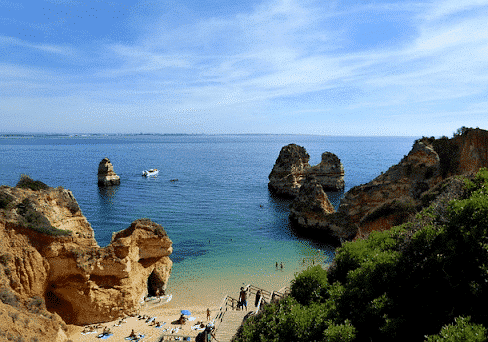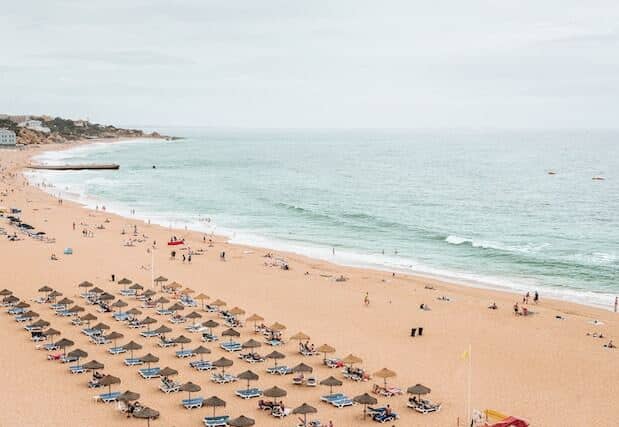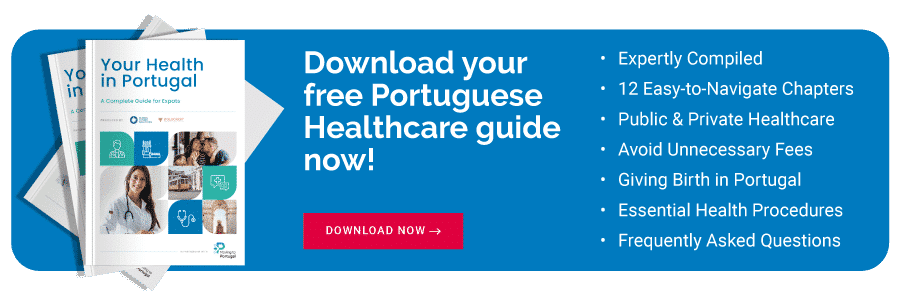The Algarve is more than just a holiday spot; it’s a place where people come to live well and retire in relaxation. With over 300 days of sunshine and a mix of coastal towns and inland escapes, it’s easy to see why so many expats, retirees, and remote workers choose to call it home.
In this article, we’ll take a look at what life in the Algarve actually looks like, from choosing the right town to buying property and the cost of living.
You’ll also find out more about:
Algarve Quick Facts
The Algarve is Portugal’s southernmost region, stretching along the Atlantic Ocean from the Spanish border in the east to the dramatic cliffs of the west. It’s about 280 kilometers (175 miles) south of Lisbon, and you can get there in roughly 2.5 to 3 hours by car or train. Faro, the regional capital, is the main entry point—home to the Algarve’s international airport and a convenient base for exploring the area’s pristine beaches and towns and tackling the many things to do in the Algarve.
Algarve Quick Facts | |
Population | 450,000 |
Climate | Mediterranean; over 300 sunny days per year |
Nearest Airport | Faro International Airport |
Beach Proximity | On the coast |
Ideal for | Retirees, adventure seekers, and digital nomads |
International schools | Approximately 13 in the surrounding metropolitan areas. |
Why live in the Algarve?
Living in the Algarve means enjoying a sun-drenched, relaxed lifestyle in one of Europe’s most scenic and affordable coastal regions.
- Year-round sunshine: The Algarve region enjoys over 300 days of sunshine each year, making it ideal for anyone who loves an active, outdoor lifestyle.
- Affordable quality of life: Compared to other parts of Western Europe, the Algarve offers a lower cost of living without sacrificing comfort or quality.
- Welcoming expat community: A large and friendly expat community makes it easy to settle in, and English is widely spoken, especially in coastal towns.
- Natural beauty: The Algarve is known for its stunning natural landscapes, from golden beaches and sea cliffs to rolling countryside and quiet villages dotted with traditional Portuguese houses.
- Modern amenities: Despite its laid-back vibe, the region has solid infrastructure, excellent healthcare, and a good selection of international schools.
Best Places to Live in Algarve
1. Lagos

The town is active year-round, with a mix of locals, expats, and digital nomads, so it doesn’t shut down in the off-season like some coastal areas.
There are plenty of restaurants, cafés, and coworking spaces, plus good healthcare and public transport. It’s also easy to get out of town, with hiking trails, surf spots, and quieter coves nearby.
Property prices have gone up, especially close to the center or beach, but it’s still more affordable than many parts of Western Europe. If you want a good lifestyle mix with all the essentials nearby and a great setting, Lagos is hard to beat.
2. Tavira
Tavira offers a slower, more traditional pace of life. It’s a historic riverside town with cobbled streets, tiled houses, and a calm, lived-in feel. You won’t find massive resorts or party beaches here—just a strong local community, peaceful surroundings, and access to some of the Algarve’s best (and quietest) island beaches via ferry.
Tavira has a growing expat scene but still feels very Portuguese, which makes it a great option for retirees or anyone who prefers authenticity over convenience. Daily life is relaxed, costs are reasonable, and the area has a reputation for being safe and friendly.
It’s not ideal if you’re looking for nightlife or coworking hubs, but if your priorities are peace, nature, and charm, it’s one of the best picks in the region.
3. Albufeira

English is widely spoken, and services are geared toward both residents and long-term visitors. The old town has a bit of character, but the surrounding areas are more modern and residential.
While it can be crowded and noisy during peak summer months, there are quieter suburbs nearby that offer better balance.
Property options range from central apartments to villas on the outskirts. If you’re looking for convenience and community and don’t mind a tourist-heavy town in summer, Albufeira is a solid, affordable base.
4. Faro
Faro often flies under the radar, but it’s actually one of the most practical places to live in the Algarve. As the regional capital, it’s home to the airport, university, main hospital, and several government offices.
It’s more of a working city than a resort town, which means it stays active year-round and has a strong Portuguese identity. The old town is charming, with traditional architecture and riverside cafés and the surrounding neighborhoods offer more space and lower costs.
While it doesn’t have direct beach access, it’s only a short drive or ferry to Ilha Deserta and other Ria Formosa islands. If you value infrastructure, transport, and a more local experience, Faro is one of the Algarve’s most underrated places to settle.
5. Loulé
Loulé sits slightly inland but still gives you easy access to the coast. It’s a traditional Portuguese market town with a strong sense of community, an active cultural scene, and a historic center that feels more local than touristy.
The Saturday market is one of the best in the region, and the town has great local shops, cafés, and schools. Because it’s not a beach town, property prices can be more reasonable, and it tends to attract families, creatives, and people looking for a quieter life within reach of the coast.
You’ll need a car for everyday life, but in return, you get more space, less noise, and better value. Loulé also has good road connections to Faro and the central Algarve coast.
Real Estate in Algarve
Buying or renting property in the Algarve is straightforward, even for foreigners moving to Portugal. There are no special restrictions, and the process is open to anyone, whether you’re planning a permanent move or just looking for a second home or real estate investment.
Renting in Algarve
Renting in the Algarve is relatively simple, but availability and prices vary depending on the location and time of year. Coastal towns like Lagos, Albufeira, and Carvoeiro tend to be more expensive in rental property – especially in summer – while inland areas like Loulé or São Brás de Alportel offer better value year-round.
Long-term rentals are available, but many properties shift to short-term holiday lets during peak season, limiting your options. Starting your search early is a good idea, especially if you’re moving in the spring or summer months. Most rentals come furnished, and leases typically run for a year with a one- or two-month deposit.
When renting, there are a few steps you need to follow:
- Obtain a Portuguese tax identification number.
- Present the landlord or real estate agency with identification.
- Pay the deposit, which includes the rent for a month. Depending on your landlord or landlady’s requirements, you may also need to pay a security deposit.
- Sign the rental contract, which must include all the parties’ personal details.
Depending on the situation, you may also need a guarantor. This is particularly the case if you rent a property for a short term.
Buying property in Algarve
If you are considering buying property in the Algarve, the average asking price is €4,385 per square meter. However, property buying costs can vary significantly depending on the specific area of the Algarve you choose and the type of property you are interested in.
According to Numbeo, a one-bedroom apartment in the city center typically costs around €1,000, while a three-bedroom apartment can average about €2,711 per square meter. It’s important to note that apartments outside the city center tend to be much cheaper.
If you are on a budget, it’s advisable to avoid city centers in larger cities. Additionally, if you are looking for long-term rental properties, we recommend starting your search early due to the increasing demand in the area.
Cost of Living in Algarve
While living costs vary based on an individual’s financial situation, the Algarve is generally considered quite affordable, especially regarding food, drinks, and utility bills. A couple can live in the Algarve on a monthly budget of €800 to €1,200, depending on their spending habits. Conversely, it is also possible to enjoy a luxurious lifestyle in the Algarve, with monthly living expenses reaching up to €5,000.
Product | Price |
Meat (per kg) | €13 |
Chicken (per kg) | €4.5 |
Eggs (for a dozen) | €1.70 |
Milk (for one liter) | €0.60 |
Banana (per kg) | €1.10 |
Apple (per kg) | €1.50 |
Bread (per 500 gr) | €1.10 |
Rice (per kg) | €0.95 |
Potatoes (per kg) | €0.85 |
Onions (per kg) | €0.95 |
Local Cheese (per kg) | €7 |
Wine (mid-range) | €5 |
Below is an approximate monthly budget for living in a coastal city in the Algarve. Note that this is one of the more expensive parts of Portugal.
Item | Cost |
Rent for a furnished two-bedroom apartment | $910 to $1,877 |
Utilities | $240 |
Groceries | $495 |
Eating out twice per week and cultural activities | $430 |
Cleaning and household help | $50 |
Health Insurance | $100 |
Transportation | $2000 |
Incidentals | $250 |
Total | $2,675 to $3,642 |
Restaurant costs
Restaurant costs will largely depend on where you want to dine. If you opt for luxury restaurants, then expect to find international prices. If you are looking for local, family-run restaurants, then you can eat very cheaply and are in for a delicious meal. You will be able to eat at many cheaper restaurants for approximately €9, which will often include the main course, coffee, and dessert.
Eating out at a mid-range restaurant costs around €20 per person, with the drink and dessert included in the price. At a more expensive restaurant, expect to pay around €35.
Internet and utility costs
Algarve Basic utilities (heating, electricity, garbage, water, etc) will cost around €99. Internet costs will fall at around €40 euros each month. One minute of prepaid mobile tariff local will cost you approximately €0.20.
Transport in Algarve
Getting around the Algarve is very easy. While traveling by car is probably the easiest option, public transportation is good. Buses are the most popular mode of transportation in Algarve, with a day pass costing approximately €3 to €7.
Traveling by train is also very cost-effective in Portugal. If you are making a long-distance journey, then trains are your best option. If you buy a train ticket a week in advance, you may be able to obtain a 40-50% discount. Indeed, prices are very affordable. For example, a train ticket from Faro to Lisbon would cost approximately €12.
Renting a car is also very easy if you plan to stay in the Algarve for a while and want to make the most of checking out all the beautiful locations. You can also rent a car for occasional use, either from Faro airport or with a local rental company. Prices are approximately €25-€30 in summer, during tourist season, and just €10 in the winter months.
Algarve's Quality of Life
Quality of life is one of the Algarve’s biggest draws. The pace is slower, the weather is consistent, and the day-to-day feels more relaxed than in bigger cities. You can spend your mornings at a local café, afternoons by the beach or out walking in the hills, and evenings with fresh seafood and a glass of wine.
The region is small enough to get around easily but varied enough that no two towns feel the same. Even in the more tourist-heavy areas, finding peace and space is still possible—especially outside of the summer months.
Healthcare is good, the air is clean, and safety levels are high. Many residents say life here feels uncomplicated. It’s also easy to stay active, with everything from walking trails and golf courses to yoga studios and cycling routes across the region. Whether you’re here to slow down or stay busy, the Algarve makes it easy to do either—comfortably.
Healthcare in Algarve
Portugal’s healthcare system is solid in the Algarve, with both public and private options available. Residents from the EU can use Portugal’s national health service (SNS), while non-EU nationals often rely on private health insurance—though many still use public clinics for routine care. The region has public hospitals in Faro, Portimão, and Lagos, along with smaller health centers and private clinics spread throughout.
Private healthcare is relatively affordable by international standards, and wait times tend to be shorter. Many doctors and staff in private facilities speak English, especially in areas with large expat communities. Pharmacies are also well-stocked and accessible, with many offering basic consultations without an appointment.
Emergency care is reliable, and ambulances are available throughout the region. If you’re planning a long-term move, register with your local health center and consider private insurance to give yourself full flexibility.
Pros and Cons of Living in the Algarve
Like the pros and cons of living in Portugal, living in the Algarve comes with trade-offs. While many expats are drawn in by the sunshine and slower pace, there are a few practical things to keep in mind before making the move. Here’s a quick look at the main upsides and the things that might take some adjusting.
Advantages
- Excellent climate with over 300 days of sunshine a year
- A slower pace of life compared with major cities, making it ideal for retirees or anyone looking to unwind
- High safety levels and low crime
- Access to amazing beaches, nature, and scenic coastal walks
- A good healthcare system, with both public and private options
- Welcoming expat communities and a growing international scene
- Affordable cost of living compared to other Western European countries
- English is widely spoken in most towns and service areas
Disadvantages
- Hotspots can be crowded and tourist-heavy in peak summer
- Public transport between smaller towns is limited
- Some areas quiet down significantly in the off-season
- Limited options for younger families or career-focused professionals
- Bureaucracy can be slow when dealing with paperwork or admin
- Long-term rentals can be harder to find due to short-term holiday lets
- Inland areas often require a car for daily errands and commuting
How to Live in the Algarve as an Expat
For EU Citizens
If you’re an EU citizen, relocating to the Algarve is a smooth process. As part of the European Union, you benefit from the freedom of movement within EU countries. To start your journey, simply register with local authorities to officially reside in Portugal.
For Non-EU Citizens
Portugal offers several immigration options for non-EU citizens looking to make Algarve their home. Here’s a look at some of the most popular visas for non-EU citizens:
Portugal Golden Visa Program
The Portugal Golden Visa program offers residency to investors who are contributing to Portugal’s economy. You can qualify by investing in sectors like art and culture or in Portugal Golden Visa investment funds.
D7 Visa Portugal
The Portugal D7 Visa is designed for financially independent individuals, including retirees, who have a passive income and wish to stay in Portugal permanently. To be eligible, you must demonstrate a minimum monthly income of €870, Portugal’s minimum wage. This visa provides an excellent pathway for those with steady passive income.
D3 Visa Portugal
The Portugal D3 Visa, or Highly Qualified Activity Permit, is aimed at skilled professionals who have secured employment or a self-employment contract with a Portuguese company. This visa is ideal for professionals and is designed to attract talent to Portugal’s workforce.
D2 Visa Portugal
The Portugal D2 Visa, also known as the Entrepreneur Visa, is designed for foreigners who wish to start or expand their business in Portugal. It’s suitable for entrepreneurs, freelancers, and independent service providers looking to invest in or launch a business within the country.
Digital Nomad Visa
The Portugal Digital Nomad Visa (D8 Visa) caters to remote working in Portugal. To qualify, you must prove a monthly income of at least €3,480, four times the Portuguese minimum wage. This visa is ideal for digital nomads looking for a base in Lisbon while working remotely.
Why choose Global Citizen Solutions for your Immigration Visa?
GLOBAL APPROACH BY LOCAL EXPERTS
- GCS has offices located across Portugal.
- Members of the US-Portugal and UK-Portugal Chambers of Commerce in Portugal, and the Investment Migration Council (IMC).
- Our expert team can help you throughout your journey to secure your Visa.
100% APPROVAL RATE
- Our successful track record in applications provides reassurance to applicants.
- We have helped clients from more than 35 countries secure residency in Portugal.
ALL-ENCOMPASSING SOLUTION
- With a single channel of communication, our approach ensures that you have complete clarity on your application.
- Our BeGlobal® Onboarding System allows for a total flow of information.
TRANSPARENCY AND PRIVACY
- Our pricing is clear and detailed, you will not face any hidden costs.
- All data is stored within a GDPR-compliant database on a secure SSL-encrypted server.
Frequently Asked Questions About Living in Algarve
What is living in Algarve Portugal like?
Living in Algarve, Portugal offers a relaxed coastal lifestyle with over 300 sunny days per year. Residents enjoy affordable living, fresh seafood, and scenic beaches. The region has a large expat community, reliable healthcare, and a slower pace of life, especially in towns like Lagos, Tavira, and Albufeira.
What is the cost of living in Algarve, Portugal?
The cost of living in Algarve, Portugal ranges from €1,200 to €2,000 per month for a single person. This includes rent, groceries, transportation, and dining. Rent for a one-bedroom apartment averages €600–€900 depending on location. Costs are lower in inland towns and higher in tourist-heavy coastal areas.
Where do expats live in the Algarve?
Expats in the Algarve commonly live in towns like Lagos, Albufeira, Tavira, and Vilamoura. These areas offer strong expat communities, English-speaking services, and beachside living. Lagos attracts younger expats and digital nomads, while Tavira and Vilamoura appeal to retirees seeking a quieter lifestyle with modern amenities.
Is living in Algarve good for retirees?
Living in Algarve is ideal for retirees due to its warm climate, low cost of living, quality healthcare, and relaxed pace. Many towns offer English-speaking doctors, walkable streets, and strong expat communities. Areas like Tavira and Carvoeiro are especially popular for their tranquility and access to amenities.
What are the pros and cons of living in the Algarve?
Pros of living in the Algarve include a warm climate, affordable cost of living, quality healthcare, and scenic beaches. Cons include limited public transport, crowded summers, and fewer job opportunities. Inland towns are quieter, while coastal areas attract more tourists and seasonal fluctuations.
Is the Algarve safe for expats and retirees?
The Algarve is considered very safe for expats and retirees. Portugal ranks among the top 10 safest countries globally, with low crime rates and a welcoming atmosphere. Coastal towns have strong police presence, reliable healthcare, and established expat networks that contribute to overall safety and peace of mind.
How easy is it to find a job in the Algarve?
Finding a job in the Algarve can be challenging, especially for non-Portuguese speakers. Most opportunities are seasonal and focused on tourism, hospitality, and real estate. Year-round positions are limited, and wages tend to be lower than in larger cities. Speaking Portuguese significantly improves job prospects.
Are there English-speaking communities in the Algarve?
Yes, there are strong English-speaking communities in the Algarve, especially in towns like Lagos, Albufeira, and Tavira. Many expats from the UK, Ireland, and North America have settled in the region. English is widely spoken in restaurants, shops, and healthcare facilities, making integration easier for newcomers.

 Gizane Campos
Gizane Campos 


